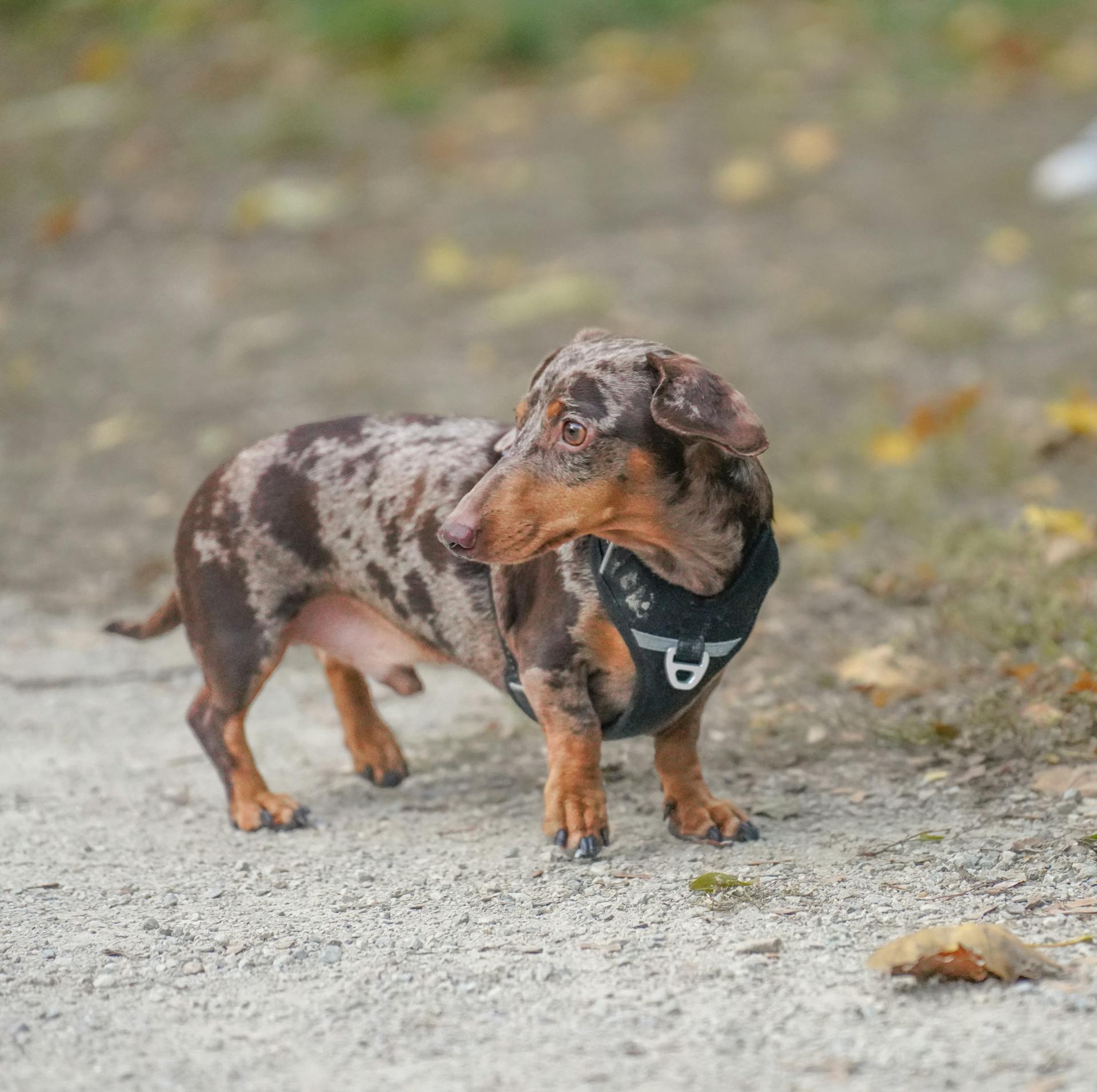
Dachshunds are known for their bold and fearless personalities, a trait that's rooted in their history as hunting dogs. They were bred to be brave and determined.
Their bold nature can sometimes get them into trouble, but with proper training and socialization, they can learn to channel their energy in a positive way. Dachshunds are naturally curious and love to explore their surroundings.
Their short stature belies their big personality, and they're often described as "big dogs in little bodies." This unique combination of traits makes them a perfect fit for active families or individuals who can provide them with the exercise and attention they need.
You might enjoy: How Big Are Dachshunds
Dachshund Temperament
Dachshunds are naturally protective and alert, making them excellent watchdogs.
They can be fearless and relentless, but this can also make them reckless at times.
Their independent nature means they may ignore pleas to return if they catch a scent trail.
Dachshunds are energetic and playful, but they do require sufficient exercise to be quiet house dogs.
Training can be challenging due to their stubbornness, but rewards can be effective.
They tend to be aloof with strangers and may not be welcoming to visitors or unfamiliar children.
The wirehaired variety is often more terrier-like, with a brash and feisty personality.
In contrast, the longhaired variety is generally more docile and affectionate.
Miniature Dachshunds may be more timid, but this is still uncommon.
Here's a summary of Dachshund temperament traits:
Dachshunds are highly territorial and may bark loudly to alert their owners to potential threats.
They can be great for families, especially seniors, but may not be suitable for households with small pets.
Their high prey drive means they may not get along with rodents or other small animals.
With proper socialization, Dachshunds can get along well with children and cats.
However, they may become destructive if left unattended for too long, so they require regular exercise and attention.
Their reputation for being stubborn and mischievous can be tempered with patience and consistency.
Consider reading: Do Dachshunds Get along with Other Dogs
Proper training is key to developing a well-behaved Dachshund.
It's essential to teach children how to interact with Dachshunds gently and respectfully.
With their bright eyes and playful personalities, it's no wonder Dachshunds are popular pets.
They're known for being energetic, courageous, and incredibly loyal to their owners.
Dachshunds can be very vocal and territorial, especially when interacting with strangers.
Proper training and socialization can help mitigate these traits and make them excellent family pets.
Dachshund Behavior
Dachshunds are known for their bold, energetic, and outgoing personalities. They are typically very loyal to their owners with a calm, even temperament.
These little dogs can be quite loud barkers, so consistent training may be necessary to make sure that barking behavior doesn't become a constant problem. Some Dachshunds may suffer from separation anxiety, so it's essential to consider their personal history when addressing behavioral issues.
Dachshunds are not typically categorized as a working breed, even though they were originally bred to hunt. They often do well as family pets, making them a great choice for many families.
Despite their small size, Dachshunds can be quite protective and alert, making them excellent watchdogs. However, their loud bark can disturb neighbors if you live close to them.
Here's a summary of some key Dachshund behaviors:
Dachshunds can be prone to health issues, so regular veterinary check-ups are essential. With proper care and attention, they can make wonderful, loving companions for many families.
Dachshund Care and Characteristics
Dachshunds can make excellent family pets, but they do require some special care and attention. They tend to be quite protective and alert, making them excellent watchdogs, but their loud barking can be a problem if you live close to neighbors.
Their high prey drive means they may not get along with pet rodents or other small animals, so it's essential to consider this before bringing a Dachshund into a household with existing pets.
Here are some key characteristics of Dachshunds to consider:
Their small size and tendency to dig can also be a challenge, so it's crucial to provide alternative activities to keep them occupied and prevent damage to your home.
Dachshund Characteristics
Dachshunds can make great family pets, but they're not always the best fit for households with young children. Their kid-friendliness is actually quite low.
One thing that's often overlooked is how much Dachshunds tend to bark. They have a loud bark and can be persistent, which might not be ideal for people who live in close proximity to their neighbors. Their tendency to bark is actually quite high.
Despite their small size, Dachshunds are quite protective and alert, making them decent watchdogs. However, this also means they require consistent training to ensure their barking doesn't become a constant problem.
In terms of exercise needs, Dachshunds require a moderate amount of physical activity to stay happy and healthy. This can be as simple as a daily walk or playtime in the backyard.
Here's a breakdown of some key characteristics to consider when thinking about bringing a Dachshund into your life:
Overall, Dachshunds can be wonderful companions, but they do require some special consideration.
Dachshund Care
Dachshunds can be a bit too tenacious for their own good, which was great for hunting but might get on your nerves at home.
They have a strong prey drive, which means they might not be the best fit for a household with pet rodents or other small animals.
Dachshunds usually get along well with other dachshunds, but they can be a bit dominant, so they might try to be the top dog in a multi-pet household.
Dachshunds have a tendency to dig, which can result in damaged potted plants and a yard that's not so pretty.
You can prevent this by providing alternative activities for your pet, like extra playtime or puzzle toys filled with treats.
Pros and Cons
Dachshunds can make excellent watchdogs due to their protective and alert nature. They tend to be quite loyal and willful, which can be a great asset in a family dog.
One of the most notable pros of owning a dachshund is their affectionate personality. They love to be around their owners and will often seek out attention and cuddles.
However, dachshunds can be prone to barking loudly, which can be a disturbance to neighbors. They bark frequently, so if you live in a close-knit community, this might be a consideration.
Dachshunds are also known for their high energy levels, which means they require regular exercise to stay happy and healthy. They are active dogs and need to be taken on regular walks or runs.
Here's a breakdown of some key pros and cons of owning a dachshund:
Overall, dachshunds can make wonderful pets for the right owner. With their loyal and playful nature, they can bring a lot of joy and companionship into your life.
Frequently Asked Questions
Are sausage dogs well behaved?
Dachshunds are generally even-tempered and affectionate, but may be snappy if play gets too rough. With proper care and handling, they can make great family pets.
Are Dachshunds difficult dogs?
Dachshunds can be challenging to train due to their independent nature, but with patience and consistency, they can thrive as loving and loyal companions. Their strong will and cleverness make them a unique breed that requires a special approach to training and care.
Is a sausage dog the same as a dachshund?
A sausage dog is another nickname for a dachshund, a loyal and active breed of dog originally bred for hunting.
Can Dachshunds be left alone?
Dachshunds can be left alone, but they require gradual training to build independence and may need more attention than some other breeds. With proper training, they can learn to tolerate periods of alone time.
What is the attitude of a Weiner dog?
Dachshunds are known for their loyal and courageous nature, making them devoted companions. With their energetic and playful personalities, they thrive on attention and interaction with their owners.
Featured Images: pexels.com


